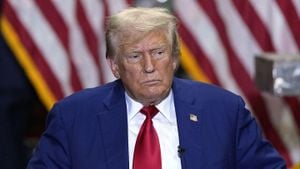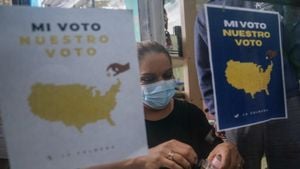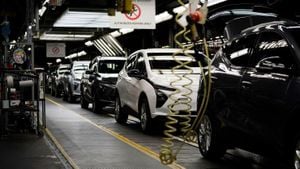New York City is once again at the heart of a contentious debate over congestion pricing as Governor Kathy Hochul prepares to reinstate the toll on drivers entering Manhattan's busy streets. This initiative, which aims to reduce traffic and fund public transportation, is set to take effect on January 5, 2025, and has stirred up mixed reactions among city residents, municipal workers, and political leaders.
On November 14, Governor Hochul announced her decision to implement the $9 congestion toll for most vehicles entering below 60th Street, known as the Congestion Relief Zone. This plan, initially slated to launch last summer with a $15 toll, was paused after substantial backlash from both local officials and the public, as reported by CBS News and The New York Times. With President-elect Donald Trump promising to terminate the program, Hochul's urgency to restore the plan is palpable.
Many at Vassar College, including students and faculty, have shared their views on this plan’s impact. Some see the toll as a necessary measure to prioritize pedestrians and improve air quality. Annie Brewer, ’25, expressed her support, saying, “I think the toll is a really great decision because it makes pedestrian life easier, and encourages people to use public transportation.” Brewer's sentiments highlight the broader goal of congestion pricing: promoting more sustainable transportation options.
Conversely, others are less enthusiastic about the toll, viewing it as another burden on commuters. Isabel Yu, ’25, who frequently travels from Gramercy, voiced her concerns: “It’s going to be at least a $9 toll.” For families like hers, this adds significant costs each time they navigate the city. Yu argues the toll unfairly impacts locals, stating, “You can’t just not go anywhere,” indicating the challenges of moving outside the congested area without incurring extra fees.
Resistance is not unique to students. Municipal worker unions, representing around 300,000 city employees, have vocalized their opposition to the toll. Harry Nespoli, chairman of the Municipal Labor Committee, urged Trump to intervene and halt the pricing. Nespoli, who leads various unions including sanitation and teachers' unions, expressed disappointment with Hochul's decision, emphasizing the financial strain it adds to those driving for work-related purposes. “How much more in costs do you want to put on city workers?” he questioned.
The toll raise has also caught the eyes of several philosophical thinkers on the governing side. Tim Koechlin, Director of International Studies at Vassar, reflected on the situation stating, “Some policies are ‘win-win.’ Not this one. There are clearly some ‘winners’ and some ‘losers.’” This sentiment sustained through numerous opinions challenges the assumption of universal benefit from such pricing systems.
Beyond local opinions, this toll has political consequences. Trump, taking office shortly after the toll's scheduled implementation, could potentially halt it altogether. His previous statements indicated staunch opposition to such taxes, asserting it would harm businesses and families within New York City. “It is the most regressive tax known to womankind,” he declared, echoing concerns from various constituents.
Alongside the political tussle, the MTA has begun emphasizing the need not just for the congestion toll but also for boosted funding to manage the city’s aging transport infrastructure. Following the delayed implementation of the toll, the authority aims to gather $33 billion over five years through various funding avenues, including the congestion pricing itself. With fare hikes planned as well, the overall expense for New Yorkers using public transport seems to be growing, leading to frustration among constituents.
Looking at the broader picture, the reality of congestion pricing highlights significant societal issues as well. Consideration of equity arises sharply, as Yu pointed out the socio-economic disparity concerning tolls. She argued those who cannot afford ride-sharing or public transport at late hours might find themselves at risk due to safety concerns. This highlights the multifaceted nature of urban transportation policies—while attempting to alleviate congestion and improve air quality, one must also address equity and accessibility challenges.
Those favoring the toll argue it will encourage reduced reliance on personal vehicles. Michael Hiciano, ’25, residing just outside the congestion zone, sees promise, noting, “I think many more people will be encouraged to take the train, which is sustainable and faster.” This perspective aligns with the city’s goal to combat climate change by promoting public transit usage.
Yet, whether the toll will be as effective as rumored remains uncertain. Critics question its impact on traffic congestion and pollution levels, asserting many who commute from suburbs may not change their driving habits due to such fees. There’s apprehension this policy might disproportionately affect working-class residents who commute daily or those who must rely on personal vehicles to meet their job demands.
Some students at Vassar, referencing their peers who work as taxi drivers or delivery persons, contend exemptions should be made for certain groups impacted by the toll. For example, traditional yellow taxis will incur limited fee increases compared to rideshares, which will see marks of $1.50 or higher for rides as analyzed by the New York Post. This slight reduction acknowledges the distinct nature of services rendered and may hold some benefit for locals depending on how it’s employed.
On the operational side, Koechlin paints the picture of necessary discomfort. “This policy... will be annoying and costly for lots of people.” Despite this, there’s recognition of its necessity to advance broader, more sustainable urban development goals. Koechlin argues this debate centers around critically important issues like enhancing urban livability and improving the environment.
The possible success of the congestion toll will be measured against projected outcomes. Traffic data gathered by INRIX outlines NYC as the most congested city, with average drivers reportedly stalling for around 101 hours each year. Such statistics indicate the urgent need for mechanisms like congestion pricing to be enacted without fail.
Though Hochul’s plan has been met with stiff political resistance, both from federal and local levels, the stakes for New York City—and its already struggling public transport system—are high. The time frame before the toll’s implementation is narrowing, and as legal challenges loom, the fate of this plan remains unclear.
With all these elements swirling, New Yorkers find themselves on the verge of significant changes to transportation norms within the city. Whether seen as progressive or regressive, the congestion pricing scheme marks just another chapter in New York City’s enduring mission to tackle its notorious traffic woes and improve the living conditions for its citizens. But as Hochul's timeline tightens, only time will reveal if this toll will be the transformative solution it promises to be—or yet another miscalculated decision amid the city’s complex urban challenges.



